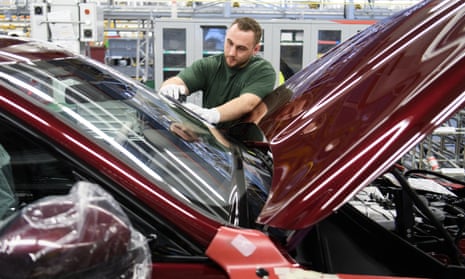Jaguar Land Rover is to cut 1,000 jobs in the West Midlands, blaming a slump in car sales due to uncertainty over Brexit and the future of diesel vehicles.
Britain’s biggest carmaker will cut 1,000 temporary contract workers at its plant in Solihull, which builds Range Rovers and the Land Rover Discovery SUV. The factory employs 10,000 workers, including 2,000 contract staff.
The company, which employs 40,000 people in the UK, will move some workers from its factory at nearby Castle Bromwich to fill gaps left by the cuts at Solihull. It is due to confirm the cuts, first reported by ITV News, and a reduction in output at Solihull as part of an update on production plans for its workforce on Monday.
The cuts are understood to have been triggered by a 26% drop in JLR sales in the UK in the first three months of 2018. Sales in Germany, Europe’s biggest car market, also slumped, dropping 32% in the same period. JLR sold a record 621,109 vehicles worldwide in 2017, up 6.5% from a year earlier. But while international sales boomed, UK sales fell 15.8% because of weakening consumer confidence.
The company is expected to say on Monday that customers are delaying buying new cars because of concerns about government policies on diesel cars. Consumer confidence in the UK had also been hit by uncertainty over Brexit.
In a statement, JLR referred to Brexit and diesel taxes obliquely as “headwinds”. It said: “In light of the continuing headwinds impacting the car industry, we are making some adjustments to our production schedules and the level of agency staff. We are however continuing to recruit large numbers of highly skilled engineers, graduates and apprentices as we over-proportionally invest in new products and technologies.”
JLR’s decision reflects a wider malaise for the UK car industry as consumers put off big purchases amid squeezed household budgets and doubts about the economy. Sales of new cars in the UK plunged in March as uncertainty weighed on demand and buyers turned their backs on diesel, extending the run of falling sales to 12 months.
JLR warned in January that hostility towards diesel vehicles and uncertainty over Brexit were affecting its business. The company, owned by India’s Tata Motors, cut production at its Halewood plant in Liverpool, blaming faltering sales, and warned that tough conditions would continue.
JLR said it was fully committed to its UK factories after investing £4bn in them since 2010. Brexit has added to consumer concerns, prompting potential customers to delay new car purchases, but JLR will stress that its long-term production plans remain unchanged.
Britain has increased the amount of vehicle excise duty paid by almost everyone buying a new diesel car from this month. Diesel accounts for around 90% of JLR’s UK sales.
The UK car industry, which employs 169,000 people, has warned that thousands of UK jobs are at risk because of the tax increase and a backlash against diesel vehicles on environmental grounds. Sales of diesel-powered vehicles dropped by 17% in 2017 but still represented almost 38% of car sales.
The UK government has said it will ban sales of new diesel and petrol cars by 2040 to improve air quality and public health. The Royal College of Physicians has warned bad air quality could be responsible for 40,000 premature deaths a year.
Campaigners have called for the government to bring the ban forward to 2030. Scotland is aiming for 2032 as its cutoff date.
A German court ruled in February that cities have the right to ban diesel motors to improve air-quality levels. The ruling left millions of drivers questioning how they would travel to work and school if there was a ban and wondering what to do with vehicles likely to plunge in value.
Car buyers in the UK are also shunning diesel vehicles after the Volkswagen emissions scandal of 2015. The German carmaker was found to have cheated regulators and misled customers by using software to suppress emissions of nitrogen oxide during vehicle tests.
